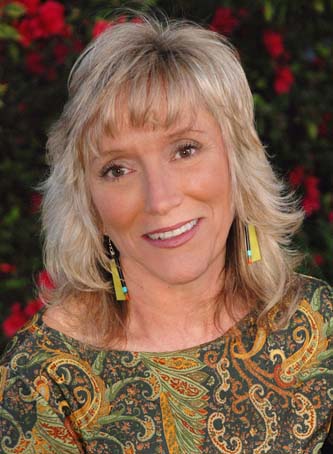Q&A with Sharon Harlan
Sharon Harlan is a Senior Sustainability Scientist in the Global Institute of Sustainability and an associate professor in the School of Human Evolution and Social Change, College of Liberal Arts and Sciences. Her work addresses the social impacts of climate change in a rapidly urbanizing environment. She also directs the Phoenix Area Social Survey, which examines the impacts of income and residential segregation on environmental inequalities. Dr. Harlan teaches courses on the social and environmental impacts of industrial production systems and on environmental justice.
When did sustainability become part of your research focus?
Ten years ago I was working with colleagues on a proposal for a social survey about the impacts of rapid urbanization on people's attitudes toward community and environment in the Phoenix area. Chuck Redman, then director of ASU's Center for Environmental Studies, gave us some key advice: Frame this work in the context of the emerging concept of "sustainability."
What are your most important sustainability-related research projects?
First, I am leading a project on urban vulnerability to climate change. This research involves social, biophysical, and health scientists in a collaborative effort to understand how various urban land covers and temperatures are associated with different neighborhoods and why we see disparities in heat-related health outcomes between low and high-income neighborhoods. A major objective of the research is to improve the capacity of inner-city neighborhoods to adapt to climate change. To accomplish this, our team is doing basic scientific research on urban ecology and health, and developing future climate scenarios for the Phoenix region. We are also working with community partners to revitalize a community gardening initiative, model the cooling effects of neighborhood parks, and learn from the perspectives of middle school students about how high temperatures affect local families and communities.
Second, I am continuing my work with the Phoenix Area Social Survey. It is repeated every five years to track public opinion on regional and neighborhood quality of life and four areas of the natural environment: land use, water supply, air quality, and climate change. This summer, we will conduct our third survey in the series, which will be administered to 900 households in 45 neighborhoods.
How will your sustainability-related research affect policy decisions?
Cities face significant health challenges from climate change and recent heat wave disasters around the world have given them a wake-up call. At the same time, climate adaptation strategies to deal with extreme heat events, air pollution, flooding, and infectious disease outbreaks have been attracting more attention globally. Our research in Phoenix provides insights about urbanization in a warmer world and also offers lessons on how cities might act to address these challenges.
What is the world sustainability challenge that concerns you most?
My priority is protecting the most vulnerable and marginalized populations from the disruptions of global environmental change. To do this, we must ensure that Earth's resources are consumed equitably, the limits of those resources are respected, and that people in all types of economies have adequate livelihoods, health care, and safe working conditions. Ultimately, we need to eliminate extreme inequalities and poverty on global, national, and local scales.
April 27, 2011


 TEMPE, Ariz., -- Michael Hanemann, a world-renowned environmental economist, has been elected a member of the National Academy of Sciences. Hanemann is the Julie A. Wrigley Chair in Sustainability at Arizona State University (ASU), where he holds joint appointments in the Department of Economics of the W. P. Carey School of Business, and in the School of Sustainability.
TEMPE, Ariz., -- Michael Hanemann, a world-renowned environmental economist, has been elected a member of the National Academy of Sciences. Hanemann is the Julie A. Wrigley Chair in Sustainability at Arizona State University (ASU), where he holds joint appointments in the Department of Economics of the W. P. Carey School of Business, and in the School of Sustainability.






 The Sustainability Consortium has announced Bonnie Nixon, formerly Hewlett Packard’s Director of Environmental Sustainability, as Executive Director. Nixon will be responsible for developing and implementing short- and long-term strategies and growing the organization to include international representation, additional non–governmental organizations (NGO’s), toy and apparel sectors, and the world’s leading life cycle scientists and research institutions.
The Sustainability Consortium has announced Bonnie Nixon, formerly Hewlett Packard’s Director of Environmental Sustainability, as Executive Director. Nixon will be responsible for developing and implementing short- and long-term strategies and growing the organization to include international representation, additional non–governmental organizations (NGO’s), toy and apparel sectors, and the world’s leading life cycle scientists and research institutions. Earth day is day busting at the seams with activity and engagement. It has grown so much here at ASU that we decided a day just wasn’t enough to celebrate this great planet of ours so we gave it a whole week. That is sun devil style for you! Please enjoy our gallery of earth day photos and be sure to become fans on facebook!
Earth day is day busting at the seams with activity and engagement. It has grown so much here at ASU that we decided a day just wasn’t enough to celebrate this great planet of ours so we gave it a whole week. That is sun devil style for you! Please enjoy our gallery of earth day photos and be sure to become fans on facebook!